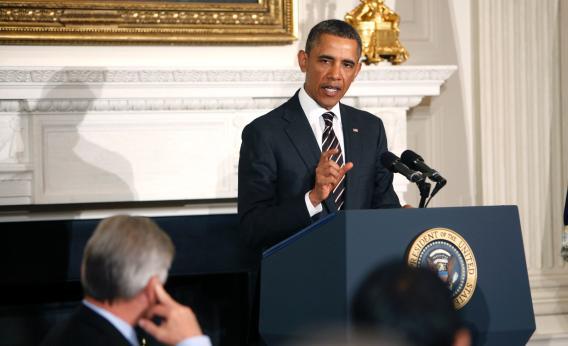Reading Jonathan Chait on the Republican Party’s weak hand in the sequestration fight, I worry that a lot of Democrats are in some ways overestimating their own strength here. Or, rather, are overestimating their own odds of obtaining the policy win that they want, namely a “balanced” deficit reduction package that trims entitlement programs and closes tax loopholes.
The basic strategy seems to be:
1. Outline position that’s much more popular than the GOP’s.
2. …
3. Profit!
This is a familiar tactical dynamic to those of us who remember the years 2009-12, aka Barack Obama’s first term in office. The problem is that while it succeeded in delivering a strong election result for Democrats in 2012, it did not suceed in inducing Republicans to abandon their obstruction. That’s not to say Obama had no policy wins. He had a bunch that resulted from Democrats controlling congress. He also once (in the 2010 lame duck session) adopted the strategy of securing policy wins (stimulus money, repeal of Don’t Ask Don’t Tell, ratification of the New START arms treaty) by trading them for tax cuts for the rich. Then during the fiscal cliff fight he won by taking advantage of the fact that higher taxes was the default outcome in case the parties disagreed. What he’s never really done, however, was actually close the loop from “Obama’s position is more popular” to “Republicans cave and do what Obama wants.”
After all, once you consider incumbency effects and the pro-GOP slant of the way House districts are drawn Republican House members are in pretty strong shape. Democrats are very focused right now on a message war in which they want the media to abandon BipartisanThink and instead state clearly and accurately that the deadlock is caused by Republican total unwillingness to compromise. But the objective challenge Democrats face isn’t really about message, it’s about turnout and the fact that key Democratic Party constituency groups (young people and minorities) don’t like to vote in midterm elections. Republicans know Democrats have this problem, and Democrats know that Republicans know Democrats have it.
None of which is to say that winning the message war has no advantage for Democrats. It’s a boon to incumbent Democratic senators facing tough races in Virginia, North Carolina, Louisana, Arkansas, South Dakota, and Montana and to Democrats running for open seats in Iowa and West Virginia. So very plausibly the current bargaining strategies will get everyone what they want—House Republicans will keep their majority and avoid tax increases, and Senate Democrats will keep their majority. The losers will be people whose voice doesn’t really count, like Republican Senate challengers and people who rely on government services.
